
Computer Engineering
CE Subjects | Demand | Jobs | Courses | Salary
Computer Engineering is a field that sits at the intersection of electrical engineering and computer science, encompassing the design, development, and integration of computer systems and networks.
This interdisciplinary field focuses on creating and implementing computing solutions that seamlessly merge hardware and software components to address a wide range of applications.

Computer engineering is an interdisciplinary field of study in computer science that spans across predominantly in computer science , electrical engineering and digital electronics .
The computer engineering profession endeavors to innovate and develop the technology necessary to build the smarter , faster and affordable computing platforms .
And therefore , the computer engineer has to study and develop skills , expertise in many fields .

Computer engineering is a dynamic and multidisciplinary field that combines aspects of both computer science and electrical engineering to design, develop, and implement various computing systems and technologies.
It revolves around understanding the computer hardware and software components of computers and their interactions to create innovative solutions that provide computational power to our modern world. This field is at the forefront of technological advancements, influencing everything from personal devices to large-scale industrial systems.
The applications of computer engineering have revolutionised every industry we can possibly think of. And today, the human world is now dependent on computers. And therefore, computer engineering professionals are in great demand across all industries.

If you are a student and are exploring computer engineering as a career option, then you will find this information very useful in your endeavor to become a successful computer science professional.
In this detailed article, we’ll explore the foundational aspects of computer engineering, its core principles, and its significance in the modern technological landscape.
Computer Engineering
Table Of Contents
- What Is Computer Engineering ?
- Applications Of Computer Engineering
- Demand For Computer Engineering Professionals
- Computer Engineering Subjects
- Computer Engineering Courses
- Top Universities For Computer Engineering Education
- Computer Engineering Careers
- Computer Engineering Salaries
What Is Computer Engineering ?
Education And Career Paths In Computer Engineering
Computer engineering is a branch of engineering that integrates several fields of computer science , electrical engineering and digital electronics required to develop faster , smarter and more powerful computing devices .
The computer system integrates both hardware and software technology . In order to develop new innovative technology , the computer engineer has to study and master different skills spanning across many disciplines.
The computer system is a digital electronic machine . That means computer hardware components have been programmed to interpret only machine code instructions in binary.
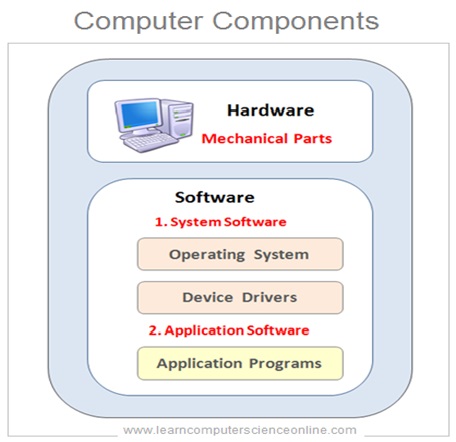

The computer engineer writes system software such as device drivers ( a system program ) so that the operating system can communicate with hardware components. The computer engineer also work extensively in the field of artificial Intelligence and robotics .
The computer engineering involves the design and integration of both hardware and software components. The computer hardware components include microprocessor , micro-controller , computer bus system , power supply and other components.
Education and Career Paths In Computer Engineering
To enter the field of computer engineering, individuals typically pursue a bachelor’s degree in computer engineering, electrical engineering, or a related field. Some may choose to specialize further through master’s or doctoral programs. The curriculum often includes courses in digital systems, programming, computer architecture, electronics, algorithms, and more.
Career opportunities for computer engineers are diverse and can be found in industries such as electronics manufacturing, software development, telecommunications, aerospace, automotive, and research institutions. Job roles may include hardware engineer, software developer, network engineer, systems analyst, embedded systems engineer, and more.
In essence, computer engineering combines theoretical knowledge with practical skills to create innovative solutions that shape the way we interact with technology. It’s a field that continues to evolve rapidly, contributing significantly to advancements in the digital age.
Computer Engineer Job Description
What Do Computer Engineers Do ?
The computer engineers are professionally trained and gain expertise in both software and hardware technology .
The computer engineer study and gain the knowledge in computer science ( Theoretical And Applied Computer Science ) , Electrical Engineering and also in Digital Electronics .
The computer engineering curriculum also includes subjects in computer programming languages . The programming languages include C language , C++ , Java , Python , JavaScript and other languages.
Due to ever increasing demand for computer programmers and software developers, many computer engineering students are employed in jobs as a software engineer Or as a computer programmer.
And therefore , the computer engineer can be employed in many industries and can effectively perform many tasks depending upon the industry needs . The job profile and the job description generally include following activities :
Computer Engineer Job Description
- Design Computer Hardware Components.
- Evaluate And Test component performance .
- Develop System Architecture Design Specifications.
- Develop System Software Components.
- Develop Device Drivers.
- Application Software Development.
- To enhance the System Performance .
- Integration Of Application Software with System .
- To Collaborate with Network Architects .
- To Resolve system , Network And other technical issues.
- To Collaborate with Database System Management Team .
- System Maintenance Tasks.
Applications Of Computer Engineering
The computer engineers work and hired by many industries . The computer engineer is a highly skilled professional who has expertise in many fields to effectively perform different roles.
Some of prominent industries with high demand of computer engineers include manufacturing , engineering , aviation , medical equipment manufacturing , Information Technology ( IT ) companies , Military Services , Government Institutions , education and these are just few names .
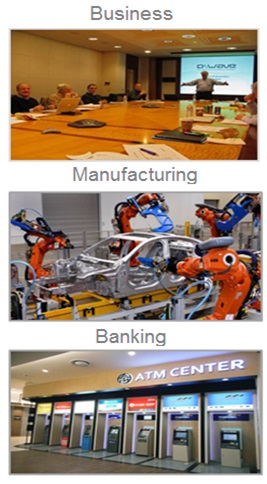

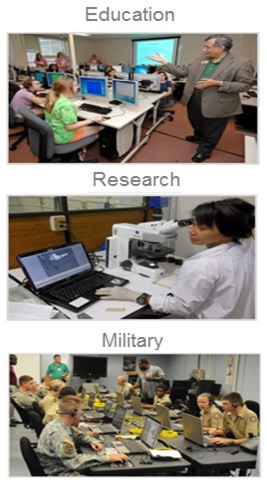
Computer Engineering Subjects
The Computer Engineering courses are offered by most of the Universities in US and as well as in other countries . Most of the courses have fair degree of uniformity in terms of subjects included in the syllabus .
In the US , the Computer Engineering courses could be joined at Associate Degree ( Generally Two Years ) , Bachelors Degree ( Generally Four Years ) , Masters Degree ( Generally Two Years Post Graduation ) and Doctorate program ( Phd ) .
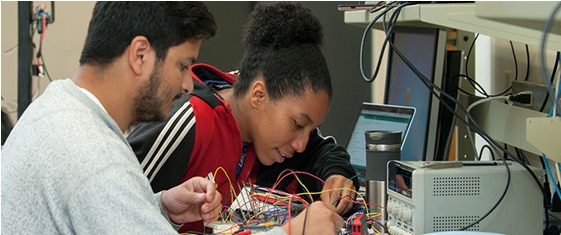
Depending upon the level and tenure of the course , the course contents might differ . Most of the Universities and colleges offer additional elective subjects that students can select .
The Computer Engineering courses also include the lab work practical and the project to be completed at the end of the course .
Computer Engineering Subjects
- Computer Architecture.
- Introduction to computer programming
- Computer Programming Language
- Data Structures And Algorithm
- Design And Analysis Of Algorithms.
- Discrete Mathematics
- Discrete Structures
- Introduction to Electrical and Electronic Circuits
- Digital Circuits
- Operating Systems
- Database and Information Systems
- Database Management Systems
- Artificial Intelligence
- Computer Networks
- Embedded Systems
- Microprocessor Design
- Project
Computer Engineering Salary
The computer engineering degree can get you a well paid job with a good corporate brand . The CE students are employed in many industries since the computer science degree combines the skills from both computer science and electrical engineering.
Most Surveys and reports indicates that the average salary for computer engineering jobs is more than 50% higher than the average National salary in the United States of America.
These surveys , reports also indicates a steady increase in the demand for computer engineers nationwide across all industries.
Computer Engineering Salary In US
Source - US Bureau Of Labor Statistics ( BLS )
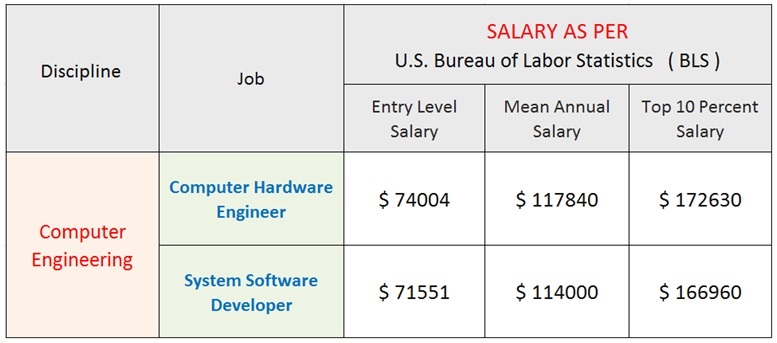
The CE salaries depends upon many factors such as industry , qualification , years of experience , technical skills and expertise in CE and location .
As per surveys and reports published by the US Bureau of Labor Statistics, the median income for computer engineering profession was $108,430 in 2014 and the top-earners make more than $160,000 per annum. These figures were $ 117840 and $ 172630 respectively for year 2019.
The CE Salaries also varies amongst the regions and industries. In CE the Scientific research and Hardware engineering jobs pays a more modest wages.
Whereas the computer hardware equipment manufacturing and system software ( Coding Device drivers ) jobs are relatively more lucrative.
How To Pick The Right Major ?
Computer Science Vs Computer Engineering
If you are a student and exploring which major to pick then you may have to pick a major between computer science and computer engineering. The computer engineering focuses more on the hardware and system architecture .Whereas the computer science focuses more on theoretical CS .
Most colleges and universities offer different Associate Degree and Bachelors Degree programs under umbrella of computer engineering .
The computer engineering primarily focuses on the application computer science and electrical engineering science for development for new computing platforms and devices.


The curriculum for both the majors in the first year ( two semesters ) generally covers the fundamentals of computer system and programming .
This foundation knowledge includes computer system architecture , memory unit , microprocessor , operating systems and other system hardware components.
The computer programming fundamentals includes basic programming foundation knowledge such as programming approaches , program statements , variables , various loops , defining function , function call , program compilation and execution . The programming languages include C , C++ And Java.
Computer Science Vs Computer Engineering
Bachelor Programs in Computer Engineering in USA 2019
The USA offers extensive options for computer engineering education . Most of the leading Universities and educations offers Bachelors , Associate degrees in computer engineering.
The computer engineering degrees are preferred choice for many students due to the consistent demand for computer engineering students by the industry.
The US universities offer wide range of courses for bachelor’s degrees in computer engineering.
The computer engineering degrees offered in the USA include subjects from theoretical and applied computer science , electronics and electrical engineering.
The student will also learn other subjects from other core subjects from computer science and electrical engineering .
Top Computer Engineering Universities In US
Top Fields Of Studies In Computer Engineering
- Hardware Design and Architecture: Computer engineers work with the physical components of computing systems, including microprocessors, memory units, input/output devices, and circuitry. They design and optimize these components to ensure efficient and reliable operation.
- Software Development: Computer engineering involves developing software that interacts with the hardware to perform various tasks. This could range from low-level programming for device drivers to high-level software applications.
- Embedded Systems: These are specialized computer systems designed to perform specific functions within a larger system. Examples include microcontrollers in household appliances and automotive control systems. Computer engineers develop and program these systems to meet specific requirements.
- Networking: Computer engineers design and maintain networks that connect computers and devices. This includes local area networks (LANs), wide area networks (WANs), and the internet. They ensure data transmission, security, and network efficiency.
- Digital Systems: This area focuses on digital logic and designing digital circuits for various applications, such as processors, memory systems, and communication interfaces.
- Operating Systems: Computer engineers work on the development and optimization of operating systems that manage hardware resources and provide services to software applications. They ensure smooth interaction between software and hardware components.
- Robotics and Automation: Computer engineering plays a crucial role in designing and programming robots and automated systems for industries, healthcare, and more.
- Signal Processing: Computer engineers work on techniques to manipulate and analyze signals, such as audio, images, and video, for applications like image processing, speech recognition, and multimedia systems.
- Cybersecurity: Ensuring the security of computer systems and networks against cyber threats is a critical aspect of computer engineering. This involves implementing encryption, access controls, and other security measures.
- Artificial Intelligence and Machine Learning: Computer engineers contribute to the development of AI and machine learning algorithms, which enable computers to learn from data and make intelligent decisions.
Fundamentals Of Computer Engineering
- Foundations of Computer Engineering:
- Hardware Design:
Computer engineering involves the design and development of hardware components such as processors, memory systems, input/output devices, and networking interfaces. This includes the integration of microprocessors, microcontrollers, and other digital circuits.
- Software Development:
Computer engineers are proficient in software development, ranging from low-level programming languages for embedded systems to high-level languages for application development. They create software that interacts with the underlying hardware to perform specific tasks.
- Core Principles:
- Digital Logic and Circuits:
Understanding digital logic is fundamental to computer engineering. Engineers design and analyze circuits using Boolean algebra, implementing logical operations that form the basis of digital systems.
- Computer Architecture:
Computer architects determine the organization and structure of computer systems. This includes defining the instruction set architecture, memory hierarchy, and input/output systems to optimize performance and efficiency.
- Embedded Systems:
Computer engineers design embedded systems, which are specialized computing devices integrated into larger systems or products. These systems often operate in real-time and are found in various applications like automotive control systems, medical devices, and consumer electronics.
- Networks and Communication:
- Network Design:
Computer engineers play a crucial role in designing and managing computer networks. This involves understanding network protocols, data transmission, and ensuring secure and efficient communication between devices.
- Wireless Communication:
With the proliferation of wireless technologies, computer engineers work on the development of wireless communication systems, including Wi-Fi, Bluetooth, and cellular networks.
- System Integration:
- Operating Systems:
Computer engineers work with operating systems to manage hardware resources efficiently. This includes processes such as task scheduling, memory management, and file systems.
- System Integration:
Integrating hardware and software components into cohesive systems is a key aspect of computer engineering. Engineers ensure that different components work seamlessly together to achieve the desired functionality.
- Applications in Modern Technology:
- Internet of Things (IoT):
Computer engineers contribute to the development of IoT devices and systems, connecting everyday objects to the internet and enabling data exchange for smart applications.
- Cybersecurity:
With the increasing threat of cyberattacks, computer engineers work on designing secure systems and developing strategies to protect sensitive information from unauthorized access.
- Emerging Technologies:
- Artificial Intelligence (AI) and Machine Learning (ML):
Computer engineers play a vital role in the development of AI and ML systems, creating algorithms and architectures that enable machines to learn and make intelligent decisions.
- Quantum Computing:
As quantum computing evolves, computer engineers explore new ways to design and implement quantum circuits and algorithms, pushing the boundaries of computational capabilities.
- Education and Career Path:
- Education:
Computer engineering programs typically cover a broad range of subjects, including computer architecture, digital systems design, programming, and networking. Graduates often hold degrees such as Bachelor of Science in Computer Engineering or related fields.
- Career Paths:
Computer engineers find employment in diverse industries, including technology companies, telecommunications, automotive, aerospace, and more. Career options include roles such as hardware engineer, software developer, network engineer, and systems architect.
Conclusion
Computer Engineering stands as a dynamic and ever-evolving field that shapes the technology-driven world we live in. From the intricate design of microprocessors to the development of complex software systems, computer engineers play a vital role in advancing computing capabilities and driving innovation across various industries.
As technology continues to progress, the contributions of computer engineers will remain integral to shaping the future of computing and its pervasive impact on society.
Join The Best Seller
Computer Science Online Course
This is the most comprehensive and unique Computer Science And Programming Fundamentals course Online which will give you in depth understanding of most important fundamental concepts in computer science And Programming .




